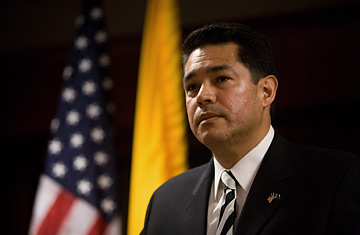
U.S. Attorney David Iglesias listens to a reporter's question at his last news conference in Albuquerque, N.M., Wednesday, Feb. 28, 2007. Iglesias said Wednesday he doesn't mind "being a political pinata," but he does resent any inference that his office wasn't doing its job.
In a statement Tuesday, Rep. Heather Wilson, a New Mexico Republican, denied pressuring Iglesias. She said she had called Iglesias because of an allegation received from a constituent that he was intentionally delaying corruption prosecutions. Wilson said Iglesias denied that allegation, explaining that he was understaffed and had limited personnel to manage corruption cases. She added that she had no input into the decision to fire Iglesias.
Also in response to Iglesias' report, Sen. Pete Domenici, a New Mexico Republican, acknowledged on Monday that he had contacted Iglesias in October 2006 to ask about his investigation into an alleged Democratic kickback scheme. But Domenici also said that he never threatened or pressured Iglesias, though he had long sought his dismissal. The Justice Department confirmed this week that Domenici had called Attorney General Alberto Gonzales and his principal deputy four times to complain about Iglesias' behavior, inquiring whether he was "up to the job." As the furor has intensified, a Washington watchdog group this week called for a Senate investigation of whether Domenici violated congressional ethics rules, which forbid members from intervening in prosecutions and trials.
Adding to the furor, a report by McClatchy Newspapers — quickly denied by the Justice Department — alleged that a senior DOJ official informed one of the fired U.S. attorneys that if any of them continued to criticize the Administration, previously undisclosed details about the reasons for the firings could made public. McClatchy attributed the account to two of the ousted prosecutors, but did not name them, and also quoted the DOJ official as saying, "I had no conversation in which I discussed with any U.S. attorney what they should or should not say to the media regarding their removal."
A resignation on Monday had already increased the questions surrounding the case. Michael Battle, the Justice Department official who made the telephone calls to dismiss six of the eight prosecutors in early December, said he was leaving his job. The Department of Justice issued a statement that described his sudden departure as long planned, having nothing to do with the controversial terminations he had to carry out. Battle, the DOJ said, had played no role in the White House-approved decision to get rid of the federal prosecutors, but had merely made the calls.
Democrats immediately questioned that version of events. "Even months after the firings, we still haven't gotten straight answers from the Department of Justice, which changed its own story... and admitted the firings weren't based on job performance," declared Linda Sanchez, chairwoman of the Judiciary subcommittee that is holding one of today's hearings. "The wheels are coming off the Bush Administration's increasingly hollow defense of its decision."
To find out what happened in the firings, four of the dismissed U.S. attorneys will appear before the Senate, and six before the House, along with a senior DOJ official who will most likely defend his department's actions. Carol Lam, a prosecutor from California, will read a joint statement on behalf of her fellow witnesses, thanking President Bush and defending the integrity and competence of the dismissed officials. Then the witnesses will answer questions.
In response to the controversy, bills are pending in both the House and Senate that would seek to insulate U.S. attorneys from political influence by restoring a system of checks and balances that would limit the period within which U.S. attorneys could be appointed without Senate confirmation.
